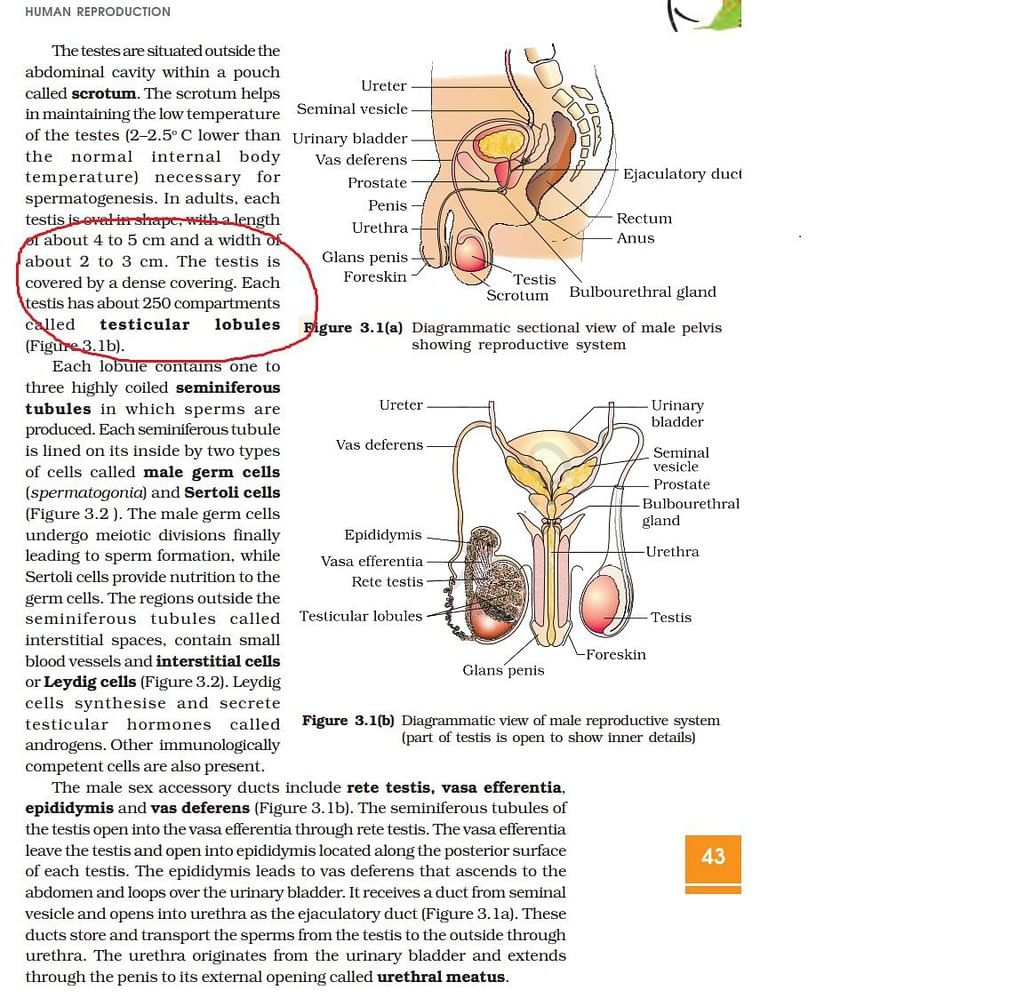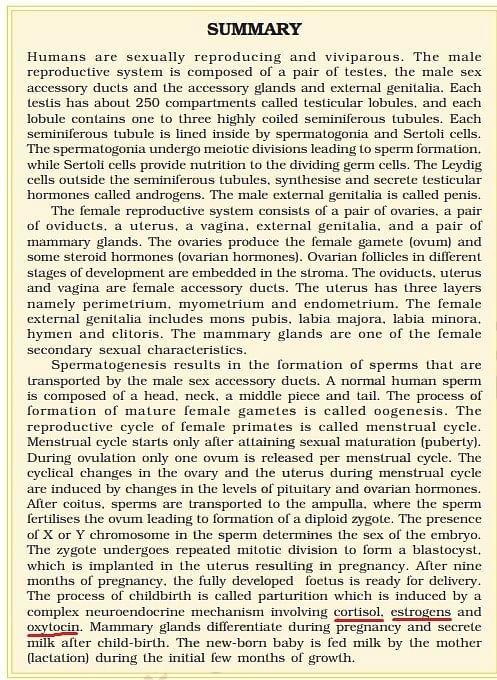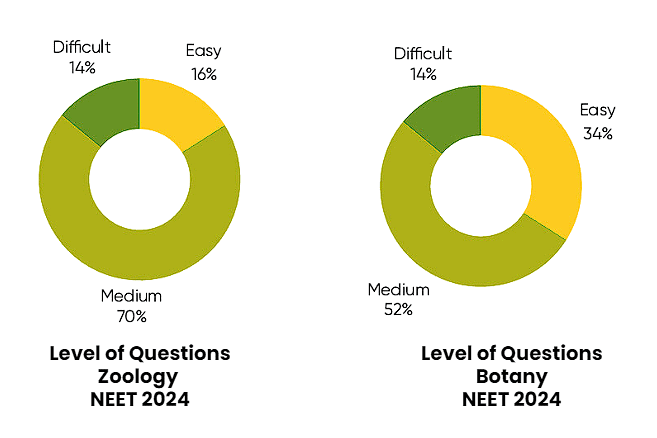How to Prepare for NEET Biology with EduRev? | Biology Class 11 PDF Download
Every candidate who is appearing for NEET feels that the Biology section is their strength. Why then do some score more than the others? The reason is the preparation strategy for NEET Biology.
Those appearing for the National Eligibility cum Entrance Test (NEET) are no strangers to the fact that the biology section of this examination is the most scoring. With 100 questions, the NEET Biology section constitutes 50 per cent of the question paper. Also, due to the theoretical nature of the subject, it is easier to score high in NEET Biology. So, how to prepare and boost your preparation for the Biology section of NEET 2026? Here are a few insights into the exam pattern as well as some key points that can help students give an edge to their preparation plan.
Here are a few insights into the exam pattern as well as some key points that can help students give an edge to their preparation plan.
Step 1: Understand the NEET Biology Exam Pattern and Syllabus
- Exam Pattern: Biology is divided into Botany and Zoology, 45 Questions each.
- Biology Syllabus for NEET: Class 11 and Class 12 questions are evenly distributed across the NEET Biology syllabus. It contains approximately 32 chapters from the combined 11th and 12th-grade curriculum. The syllabus of NEET Biology 2026 is as follows:
(i) Class 11
- Diversity in the living world: The Living World, Biological Classification, Plant Kingdom, Animal Kingdom.
- Structural Organisation - Plants and Animals: Morphology of Flowering Plants, Anatomy of Flowering Plants, Structural Organisation in Animals.
- Cell structure and function: Cell-The Unit of Life, Biomolecules, Cell Cycle and Cell Division.
- Plant physiology: Photosynthesis in Higher Plants, Respiration in Plants, Plant - Growth and Development.
- Human physiology: Breathing and Exchange of Gases, Body Fluids and Circulation, Excretory Products and Their Elimination, Locomotion and Movement, Neural Control and Coordination, Chemical Coordination and Integration.
(ii) Class 12
- Reproduction: Sexual Reproduction in Flowering Plants, Human Reproduction, Reproductive Health.
- Genetics and Evolution: Principles of Inheritance and Variation, Molecular Basis of Inheritance, Evolution.
- Biology and Human Welfare: Human Health and Diseases, Microbes in Human Welfare.
- Biotechnology and its applications: Biotechnology - Principles and Processes, Biotechnology and its Application.
- Ecology and environment: Organisms and Populations, Ecosystem, Biodiversity and its Conservation.
Go through the detailed topic-wise syllabus of biology for NEET through this doc: NEET Revised Syllabus 2026: Topic-wise Details & Important Chapters
Step 2: Read & re-read NCERT and build your concepts.

- Read NCERT before studying the chapter from the video lecture: Before starting any chapter, first read it from the textbook. Even if you're left with countless confusions, don't worry, just read it through once. After you have completed the chapter from the video lecture, go back and read the textbook again. This simple approach will work wonders in clearing your doubts and solidifying your understanding of the topic at hand. Also, Edurev has made it easier for you to access all the NCERTs for Biology by compiling them for each and every chapter. This way, you won't have to spend time searching for the book all over the place.
- Understand the Concept: Attend lectures by your teachers or you can watch video lectures from EduRev. This will help you understand the concepts better and clarify any doubts you may have.
- Each and every line of NCERT is important: Read each and every single line of the textbook and highlight the most important lines.
- No Doubts should be left behind: If you have uncertainty or confusion regarding even a single sentence, it is important to ask your teachers or you can ask in the EduRev discussion forum. Don't hesitate to ask; clearing your doubts will help you build a strong foundation in the subject.
- Elaborate the flowcharts: Condense flowcharts into paragraphs. Biology is a visual subject, and flowcharts are a great way to understand complex processes. However, it's important to condense them into paragraphs to help you remember the details.
- Keep a Keen eye on Numerical values: Having a good understanding of the numerical values given in the textbook is extremely important for taking the NEET exam.
For example, in the Human Reproduction chapter, on the second page of the textbook, it is stated that each testis contains 250 lobules. However, it is possible that the NTA may ask a question that requires you to calculate the number of lobules in a pair of testes. In such a situation, you would need to calculate the number of lobules to be 500, and not 250. To ensure you don't get confused in the exam, it is beneficial to make a note in your textbook and calculate the number of lobules in a pair of testes beforehand. This small habit of double-checking the numerical values can make all the difference in acing the NEET exam. These things are very little to notice that’s why NEET is one of the toughest exams.
To ensure you don't get confused in the exam, it is beneficial to make a note in your textbook and calculate the number of lobules in a pair of testes beforehand. This small habit of double-checking the numerical values can make all the difference in acing the NEET exam. These things are very little to notice that’s why NEET is one of the toughest exams. - Simplify your NCERT: Use sticky notes, colored pens, and highlighters to simplify your textbook. These tools can help you organise your notes and make important concepts stand out. Simplifying your textbook will help you remember important details.
- Understand the Processes given in NCERT: It is important to understand all the processes of NCERT in detail before attempting to memorise them. For instance, if you are studying the Krebs cycle as given in the textbook, memorising it would be of no use if you were to answer a question such as 'How many substrate-level phosphorylations occur in one cycle of Krebs?' which was asked in the previous year NEET exam.
 Kreb's CycleTo be able to answer this type of question, you must have a thorough understanding of the terms used in the Krebs cycle. Simply memorising the material will not be enough.
Kreb's CycleTo be able to answer this type of question, you must have a thorough understanding of the terms used in the Krebs cycle. Simply memorising the material will not be enough. - Don’t Skip NCERT Summary: Many NEET aspirants overlook the summaries from the textbook; however, a lot of questions in the past have been asked from them. For example, in the chapter on Human Reproduction, the significance of three hormones - cortisol, estrogen and oxytocin - are outlined in the summary, while the main content only mentions the importance of cortisol.
 Consequently, if such questions come up in the NEET exam, some may think that the questions are not from the NCERT, which is not correct.
Consequently, if such questions come up in the NEET exam, some may think that the questions are not from the NCERT, which is not correct. - Solve NCERT Exercises: Some of the exercise questions may require you to answer questions that cannot be found directly in the text. For such questions, you should seek assistance from your teachers.
- Remember Examples: NCERT contains so many examples that you need to remember. Like the examples given in Morphology of Flowering Plants, it is recommended to make a list of them and create mnemonics to help with memorisation. This is the most effective way to remember the information and recall it during exams.
- Strictly NCERT-oriented Short Notes: It is compulsory to make your own notes, which should be strictly NCERT-oriented & make sure to include all the keywords. This is because questions in the NEET exam are based on these keywords, and if you can recall them quickly, you should be able to finish the paper in the allotted time.
- Solve NCERT-based MCQs & PYQs: If you keep on studying the chapter notes repeatedly, it can become tiresome. To remember the topics better and to keep yourself motivated, it is suggested that you solve the NCERT-based questions and PYQs shortly after completing the chapter. You can practice these PYQs and NCERT-based questions from EduRev. This will help you understand the level of your preparation and whether you need to further upgrade it.
A common misconception among NEET Aspirants
While it’s true that most of the questions on the exam come from the NCERT textbooks, but some questions may be harder for students to answer as they find it challenging to recognize that these are from the NCERT books. This could be because they have only gone through the book 2-3 times only. But if you have gone to the depth of the book you might have the idea that its just a tough question but it is from NCERT only.
So, it is important that: by the time of the D-day, you should have gone over the NCERT enough number of times to ensure that you are confident that you have thoroughly absorbed and understood all the content of NCERT biology line by line.
Step 3: Strategise and focus on topics with high weightage
While studying Biology for NEET, you should be aware that the Biology syllabus is extensive and requires in-depth knowledge. It is advised to split the syllabus for biology into 3 parts, for easy preparation. Generally, the question types for the exam will be from three types of chapters, they are:
- Must-Do: It includes questions from topics such as Animal Respiration, Reproduction & Development, Animal Nutrition, Animal Tissues, Biotechnology, Ecology, and more.
- Do Only if you have sufficient time: This section includes chapters like the Anatomy of Flowering Plants, Animal Kingdom from Porifera to Echinoderms, Microbes and Origin of Life, Growth Repair, Regeneration, Biodiversity etc.
- Do or Die: The category covers important topics like Photosynthesis, Cell Structure, Plant Morphology, Plant Nutrition, Genetics, Monera, Plant Kingdom, and many others.
NEET Biology Weightage
You should focus on preparing for topics with high weightage as these can help you score more marks. Additionally, it will help save time for revision and strengthen your preparation for the most important chapters.

| Botany | |
Genetics and Evolution | The very necessity of studying this part is because of the weightage that this unit carries. |
| Ecology and Environment Weightage = 19.15% | Since Ecology and Environment is the second highest in terms of weightage, a thorough understanding of the chapter is essential. |
| Plant Physiology Weightage = 17.02% | The weightage given to the segment is not something one can ignore, so that makes this unit very vital. |
| Cell Structure & Function Weightage = 14.89% | A cell is the most fundamental unit of life and so its study is very intriguing. Along with this, the weightage of the unit makes this segment important. |
| Sexual Reproduction in Flowering Plants Weightage = 8.51% | This segment deals with the important process of reproduction in plants. As plants are the ultimate providers of food to all organisms, their continuity on the earth is of utmost importance. So, this makes the unit worth studying. |
| Zoology | |
Human Physiology | The study of the function of the human body is known as Human Physiology and it’s natural to find the topic intriguing. From the exam perspective also, this segment comprises the maximum percentage of weightage. |
| Biology and Human Welfare Weightage = 18.60% | The topics are of general interest and make us aware of how biology can be used for the welfare of mankind. A considerable weightage in the exams also makes it essential to study. |
| Reproduction Weightage = 13.95% | Reproduction is an interesting topic as it involves the processes right from conception to the birth of human beings. The topic carries a substantial weightage as well. |
| Biotechnology Weightage = 11.63% | Biotechnology is basically the application branch of biology, so it is interesting and informative. The technological aspect of Biology is catered to through biotechnological tools. A substantial weightage is also a factor that makes the study of this segment crucial. |
| Biomolecules Weightage = 9.30% | Understanding the highly essential molecules that make up the body is vital for the functioning of the body and also for NEET’s prep. |
Top 10 Chapters in Recent Years
Name of the Chapter | Questions |
Molecular Basis of Inheritance | 10 |
Biotechnology: Principles & Processes | 7 |
Organisms & Population | 6 |
Animal Kingdom | 5 |
Cell Cycle & Cell Division | 5 |
Plant Kingdom | 4 |
Cell | 4 |
Biomolecules | 4 |
Plant Growth & Development | 4 |
Biotechnology & its Application | 4 |
Although you should cover all the topics given in the syllabus, emphasising the more important chapters according to weightage will give you better results.
Step 4: Focus on Diagrams & Conceptual Clarity
To ace NEET Biology, conceptual clarity is a must. While revising your chapters, develop an understanding of the concepts first and then apply those concepts to problems. Moreover, a deep understanding of the topic can help you master it with ease.- Mind maps: You should make your own notes of the NCERT for referring again and again. Revision can be done through mind maps also. EduRev provides you with chapter-wise mind maps, which aid in better learning. Check them out here.
- Tables and charts: According to toppers, you should make short notes in tabular form, which makes memorising easy and effective. Names of microorganisms, Nomenclature, and differences should be learned in a smart way i.e. in tabular or chart format.
- Make notes: Try making notes in the side margin of the NCERT textbook so that the important points do not get missed out while revision. Also, if while studying, a doubt arises in your mind, note it down in the side margin. In this way, that doubt is cleared in your mind every time you do revision.
- Diagrams: Practice more and more diagrams and paste them around to keep a regular revision, and also to give color to the study space. Revise all diagrams and tables from the NCERT books thoroughly.
- Practice diagram-based questions: Many questions in the Biology section are based on diagrams. Practice all the diagrams from the NCERT textbooks and learn to label them well. Thorough knowledge and proper practice of diagram-based questions are definitely going to strengthen your preparation for NEET Biology.
Step 5: Practice: NEET PYQs, Topic-wise tests, Chapter-wise tests
While studying for the NEET Biology exam, you must develop the habit of putting in a lot of practice time. The theory's concepts can only be implemented through practice.
- Solve NEET PYQs: Never forget the most important step in your preparation is to refer NEET previous question papers of biology. It provides an idea about the question patterns and is the best way to practice and revise. You must solve PYQs for a better understanding of the question type and pattern. You can start practising by clicking here.
- Attempt Practice questions for Biology: Solving questions is really important to increase speed and to get familiarised with every concept. You can practice exercise questions (with solutions) and exemplar problems (with solutions) from EduRev also, click here.
- Revise through short notes: You can practice and revise notes, videos, and tests from the EduRev course of Class 11th Biology and Class 12th Biology, which is entirely based on NCERT.
Practice topic-wise tests: Practice topic-wise tests of biology as soon as you complete any topic, and you want to test yourself. You can find the link for Biology topic-wise tests here.
- Practice chapter-wise tests: After the completion of the chapter, practice chapter-wise tests. Practising chapter-wise tests will check your knowledge and understanding of the entire chapter. You can find the link for chapter-wise tests here.
- Additional books for Biology: Truman’s Objective Biology - Tyagi & Goyal can be used for the practice questions, but the NCERT must be done entirely before going to any other book. Whether it is Truman's Objective Biology Book or NCERT, EduRev compiled all types of questions that are important from an exam point of view in its platform. You can attempt topic-wise tests as well as chapter-wise tests from EduRev.
- Practice subject-wise mock tests: You can also practice subject-wise tests. Whenever you feel that you have prepared enough for biology, you can start giving biology subject-wise mocks right then. You can start your practice right now by Clicking Here.
Step 6: Take up Mock tests & attempt Practice Test Series
- For checking the level of your preparation you should start attempting mock tests, even if your preparation is completed just for one subject, you should start attempting subject mocks. EduRev provides you with Biology subject mocks for your excellent practice in Biology.
- When you are attempting complete mocks, you will start learning the management of time as well as the discipline to sit straight for 3 hours. For complete mocks Click here.
- As Biology is a scoring subject and by a good attempt, you will get a 360+ overall score without a doubt, for which it is a must to practice more and more mocks and that will give you familiarity with the questions in biology.
- You must mark the important and tricky questions while attempting the mocks and go back to them from time to time.
- You must give lots of previous years' question papers so that you will get yourself in line with the pattern and type of questions coming in NEET Biology. You can find the previous 10 years' question papers on the EduRev platform, Click here. As well as you will also find Biology PYQs of 31 years on our platform, click here.
When is the Right Time to Begin Taking Complete Mock Tests?
Let’s divide this into 2 categories one for students who are giving NEET UG for the first time and second for the droppers.
- For first-time NEET UG test-takers, there are two years to explore the syllabus thoroughly. It is important to stick to a study plan It is also important to take part tests seriously before moving on to full-syllabus tests.
- If you are a dropper, it is recommended that you attempt all the part tests, however, not attending a few of them is not a major issue. Instead, focus on improving the sections that you are weaker in.
- If you are a first-timer, it is recommended to begin giving full syllabus tests at least two months before your exam. For example, if your exam is scheduled for May, you should start your mock tests in March. Additionally, if you have already finished your class 11 syllabus, you should attempt 10-12 mock tests of class 11 throughout the year.
- Droppers can begin their full mock exams when they are done with their syllabus, be it before three months, two months, or even one month. However, they should bear in mind that if they start giving mock tests in the last month, they must take a mock test every single day without skipping any. Even it is obligatory for all people, regardless of whether they are first-time test-takers or dropouts, to take and evaluate a mock test every day during the last month.
- Train your mind to take practice tests during the same time frame as the actual NEET Exam (2-5 pm each day) so that you can get accustomed to being alert during this period of the day. It's like forming a habit, and if you take tests at different times, you may find yourself feeling drowsy during the allotted time period.
- Don't be afraid to make mistakes when taking mock tests, as the more mistakes you make and learn from them, the fewer mistakes you'll make in the actual NEET Exam.
- Don’t fall into a cheating pattern: Sometimes it may seem like a good idea to collaborate with a friend and split up topics so that you can both get better scores on a mock test. However, this is not a good long-term strategy and will be detrimental as it will make it much more difficult for you to learn the topics later on which you are skipping right now. So, Avoid this type of cheating to make sure you are properly learning the concepts.
- Don’t be scared of less marks: When taking mock tests from the comfort of home, it might be tempting to refer to formulas from books or notes. But this approach can lead to an unhealthy state of mind where you're always relying on such formulas, rather than testing your knowledge. Therefore, it's important to give tests without shortcuts and evaluate your knowledge on the basis of what you remember and how fast you can recall the concepts.
Step 7: Revise Consistently
You should keep revising at regular intervals to reap the full benefits of studying and practising NEET Biology. This ensures that the information learned remains fresh in the mind.

- NCERT biology revision must be done around 20-25 times.
- You can revise notes from the EduRev course of Class 11th Biology and Class 12th Biology which is entirely based on NCERT.
- Write extra content or questions in the margins within the NCERT so that revision can be done easily.
- Do frequent revision of your own notes many times. Avoid wasting your precious hours on revision without a plan. As some students spend 2-3 hours revising a single chapter, which is the same amount of time they spent studying it for the first time. Hence, set a maximum time of one hour for each chapter you revise.
- While revising if you encounter doubts, do clear them and don't move forward before that.
- The revision will help you in understanding and retaining the concept in mind more and more.
- For revising the notes, EduRev provides you with short revision notes of biology that too completely based on NCERT, for revising Click here.
- The best revision is through by giving Subject wise tests, topic-wise tests, Part tests & Full Mock Tests. EduRev provides all these tests for you to revise excellently.
For fast-track preparation, refer to our 4-month NEET planner created by experts. It covers the entire syllabus and includes a practice test.
Best of luck for your exam
Additional Information
1. Overall Understanding of the Exam
Check out these documents and prepare your strategy for NEET accordingly
- NEET Syllabus 2026, Important Chapters and Cut-Off
- How to Prepare for NEET with EduRev?
- Importance of NCERT for NEET
2. Check out Subjectwise Strategies
|
150 videos|399 docs|136 tests
|
FAQs on How to Prepare for NEET Biology with EduRev? - Biology Class 11
| 1. How can I effectively prepare for the NEET Biology exam? |  |
| 2. What are some important tips for studying biology for NEET? |  |
| 3. How important are diagrams in NEET Biology preparation? |  |
| 4. What should be the focus while practicing for NEET Biology? |  |
| 5. How can I improve my conceptual clarity in NEET Biology? |  |






















